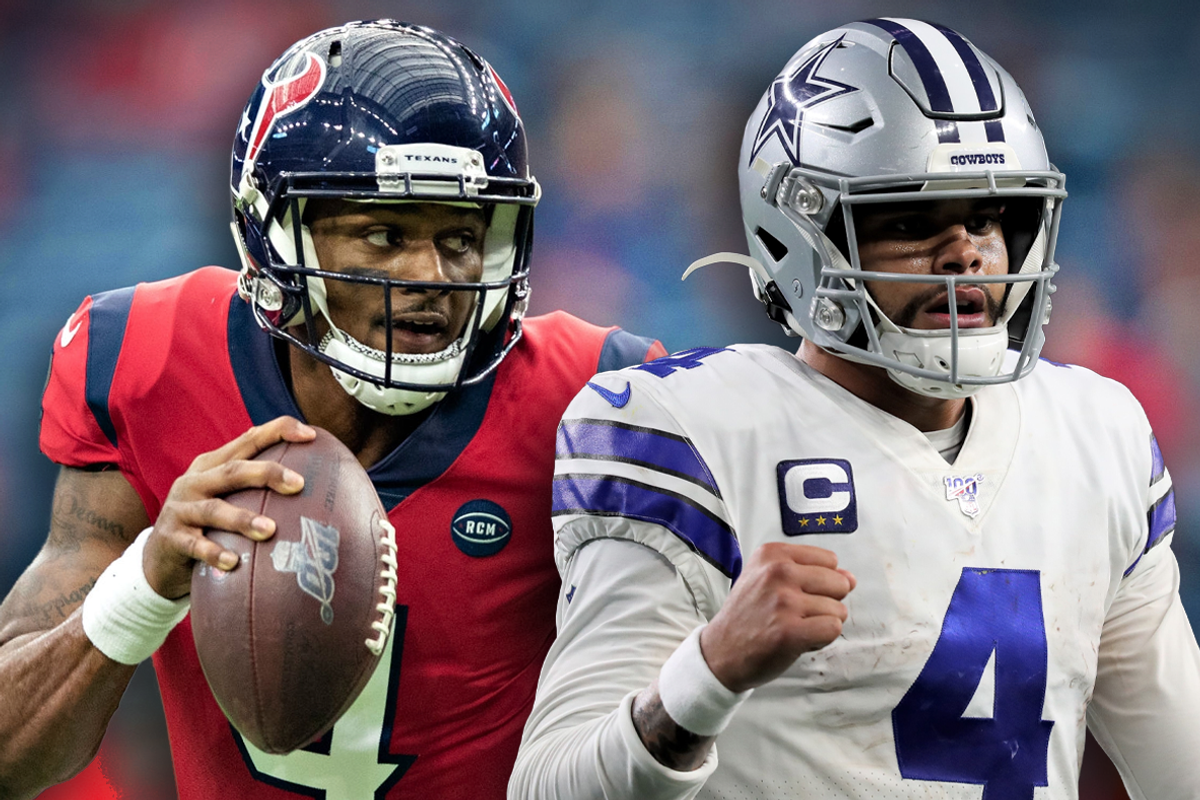DOLLARS AND SENSE
How Prescott and Watson contracts expose glaring flaws in NFL compensation
Mar 9, 2021, 1:09 pm
DOLLARS AND SENSE

Well, it didn't take long for the Texans' $39 million-a-year quarterback Deshaun Watson to be underpaid.
Dak Prescott signed a contract Monday that will pay him $160 million over four years, with $126 million of it guaranteed, plus a $66 million signing bonus up front. That's an all-time NFL record for an autograph. Next season, all-in, Prescott will make $75 million. That's for one season.
This isn't to say that our guy (for now) Watson is working for minimum wage. He's the third highest-earning quarterback in the league. Last year, Watson signed a four-year, $156 million deal that will pay him $39 million per year, with $111 million guaranteed, and a $27 million signing bonus. Prescott beats him in line item.
Only the Kansas City Chiefs quarterback has a richer contract, $450 million over 10 years. With bonuses and incentives, Patrick Mahomes' deal could be worth more than a half a billion bucks.
Prescott and Watson's situations may be the better deal in the long run. Prescott will be 31 and Watson only 29 when they're ready for a new contract. With TV contracts expiring, ticket prices soaring and the stock market booming, the sky may be the limit for Prescott and Watson.
Consider this, Jerry Jones paid $154 million to buy the Dallas Cowboys, the whole team, in 1989. He will pay Prescott, one player, more than that the next four years.
Let's compare apples to apples, Prescott to Watson. Prescott makes more per year, has more money guaranteed and a bigger signing bonus. Plus Prescott has better receivers, better running backs, better offensive linemen and plays for a better team with a better owner.
To paraphrase Jerry Seinfeld flying in first class: better everything!
There's only one problem with the comparison: Prescott ain't better than Watson.
Prescott's best year was in 2019, when he threw for 30 touchdowns with 11 interceptions. The Cowboys went 8-8 that year.
Last year, Watson threw 33 touchdowns and with only seven completions to the other team. You don't need to be reminded that the Texans finished with a sucky 4-12 record.
Watson is faster, has a cannon arm and is a lifelong winner, at least until the Texans got hold of him. He's two years younger than Prescott. He's a more accurate passer, and a better deep ball heaver. He has a higher career completion percentage and higher passing rating. Nobody beats Professor Watson's post-game interviews.
Here's how you can determine who's the better quarterback. If things were normal (they're not), and Jerry Jones called Punkin' Cal McNair and offered to trade Prescott for Watson, the Texans would say no thanks. The Cowboys would take the deal and probably hornswoggle the Texans into throwing in draft picks and a sno-cone.
Of course this is a moot scenario because Watson wants out of Houston. The Texans are playing hardball, insisting they have no intention of trading Watson, which is the cherry on top of the Texans' stupid streak regarding their star quarterback. The Texans will embarrass themselves a few more times, but there will be somebody else playing quarterback next season.
Here are other quarterbacks making more than $30 million per year: Russell Wilson ($35 million), Jared Goff ($33.5 million), Aaron Rodgers ($33.5 million), Kirk Cousins ($33 million), Carson Wentz ($32 million) and Matt Ryan ($30 million). In cases like Wentz and Goff, it's like they say in those TV commercials for stock brokerages: past performance is no guarantee of future results.
Meanwhile, there's a quarterback in Tampa Bay who's playing for relative peanuts. Some guy named Tom something makes only $25 million. Haven't heard much about him lately, though.
Oswald Peraza hit a two-run single in the ninth inning to help the Los Angeles Angels snap a three-game losing skid by beating the Houston Astros 4-1 on Saturday night.
Peraza entered the game as a defensive replacement in the seventh inning and hit a bases-loaded fly ball to deep right field that eluded the outstretched glove of Cam Smith. It was the fourth straight hit off Astros closer Bryan Abreu (3-4), who had not allowed a run in his previous 12 appearances.
The Angels third run of the ninth inning scored when Mike Trout walked with the bases loaded.
Kyle Hendricks allowed one run while scattering seven hits over six innings. He held the Astros to 1 for 8 with runners in scoring position, the one hit coming on Jesús Sánchez’s third-inning infield single that scored Jeremy Peña.
Reid Detmers worked around a leadoff walk to keep the Astros scoreless in the seventh, and José Fermin (3-2) retired the side in order in the eighth before Kenley Jansen worked a scoreless ninth to earn his 24th save.
Houston’s Spencer Arrighetti struck out a season-high eight batters over 6 1/3 innings. The only hit he allowed was Zach Neto’s third-inning solo home run.
Yordan Alvarez had two hits for the Astros, who remained three games ahead of Seattle for first place in the AL West.
Peraza’s two-run single to deep right field that broke a 1-1 tie in the ninth.
Opponents were 5 for 44 against Abreu in August before he allowed four straight hits in the ninth.
Astros RHP Hunter Brown (10-6, 2.37 ERA) faces RHP José Soriano (9-9, 3.85) when the series continues Sunday.
